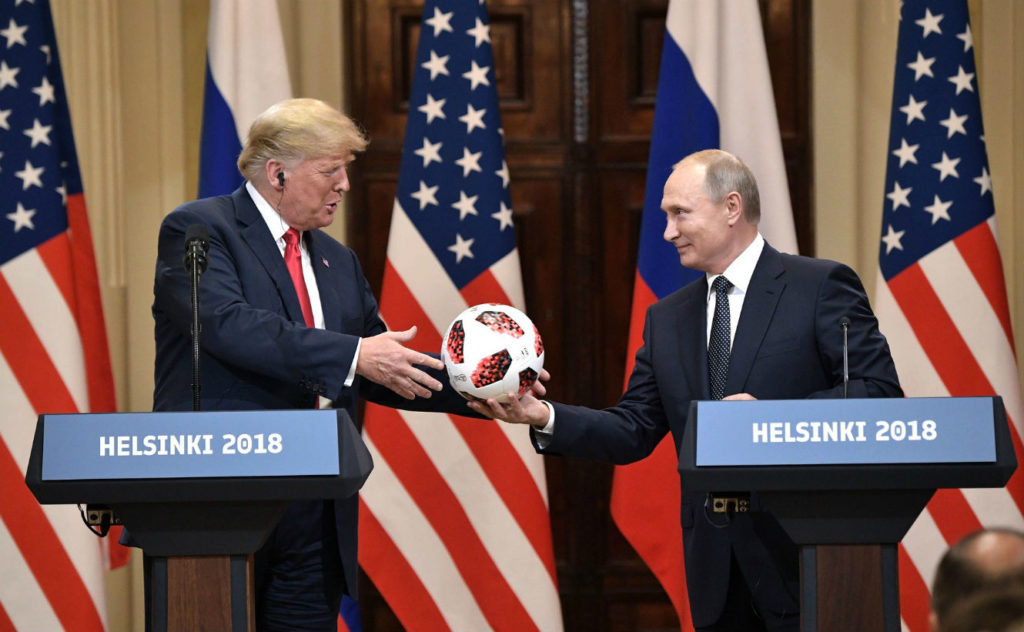How the Big Lebowski Explains the Helsinki Summit and the International Order

The fear in the West prior to the Helsinki summit between Russian President Vladimir Putin and U.S. President Donald Trump was that Trump would simply give away concessions on Crimea, Syria, or U.S. troops in Eastern Europe. We had it wrong: Instead, Trump gave away America.
Watching Trump at the podium in Helsinki felt very much like watching the end of the American era. It crystallized a moment in which a still-powerful nation lost all sense of its role and purpose in the wider world.
It is important, however, to be precise about why it felt that way. It is not about any policy per se. One can legitimately disagree about the complex issue of how to deal with Putin’s Russia (and, trust us, the authors of this piece do). Trump is clearly wrong to reject the intelligence community’s unanimous judgement on Russian interference in the U.S. election. And he is right in his own strange way to complain about NATO spending and the confusion of U.S. Syria policy. But Trump’s sins in Helsinki transcend mere issues of right and wrong.
We are reminded of the words of that great political philosopher Jeffrey Lebowski (aka the Dude): “You’re not wrong, Walter, you’re just an asshole.”
The U.S. president is supposed to be a leader of his country and its alliances. Leadership imposes certain requirements on both individuals and nations. It means they need to ruthlessly promote the interests of the people they purport to lead. They need to visibly side with them against outsiders and inspire them to overcome their common problems. This is not primarily a question of getting the facts right. It is a question of getting people and nations to follow you, the very definition of leadership. Without such leadership, unity and coherence in U.S. foreign policy or in the transatlantic alliance is impossible.
Trump, by contrast, thinks only of himself. He cares little for those in his charge – either the American people or people of allied nations – and elevates his own problems above all other considerations. He sells out others, even those for whom he supposedly has responsibility, at the drop of a hat. In Helsinki, Trump, seemingly overawed by Putin’s very presence, did not take responsibility for America or the West, but rather chose to pursue his petty domestic squabbles and salve his own fragile ego. He sided with Putin over his own intelligence community on the question of election meddling. He blamed America for the ills in the U.S.-Russian relationship. And he repeatedly sought to score points against his domestic political opponents rather than to represent all his constituents in front of the Russian president.
It doesn’t matter if he is right or wrong about any of these issues. Trump failed to lead his country, and he failed to demonstrate that his country can lead an alliance.
So forget about how many U.S. troops are in Europe or the intricacies of the U.S.-Russia mutual legal assistance treaty. The more fundamental point is, as former Polish Foreign Minister Radek Sikorski noted on Twitter, that “now, as a U.S. ally, we are supposed to believe that if President Putin launches a hybrid war, or even a nuclear strike against Poland, President [Trump] will threaten to nuke him back.”
After Helsinki, who can believe that? Do you? The faith that America will support its allies against Russia is simply gone. Armies are only as good as a willingness to use them, and alliances only endure for as long as their members believe in each other. And without a sense of American solidarity and leadership, the U.S. presence in Europe (and everywhere else) means nothing, regardless of the disproportionate burden it bears.
It was these notions of America as a leader of nations and of its president as a leader of people that Trump gave away in Helsinki. We will not easily get them back.
Of course, Trump is just the president, not the nation. If the nation, and particularly the leadership of the Republican party in Congress, repudiates Trump, the American era may yet endure. But given the mass displays of political cowardice from most of the Republican caucus over the last 18 months, it is hard to be sanguine about such an outcome. So, in troubled times, we turn once again to the Zen of the Dude and remind ourselves that, despite it all, America abides.
Kori Schake is the Deputy Director-General of the International Institute for Strategic Studies. She teaches in War Studies at King’s College. Jeremy Shapiro is Director of Research at the European Council on Foreign Relations. Previously, he worked at Brookings and at the Department of State.
Image: kremlin.ru

